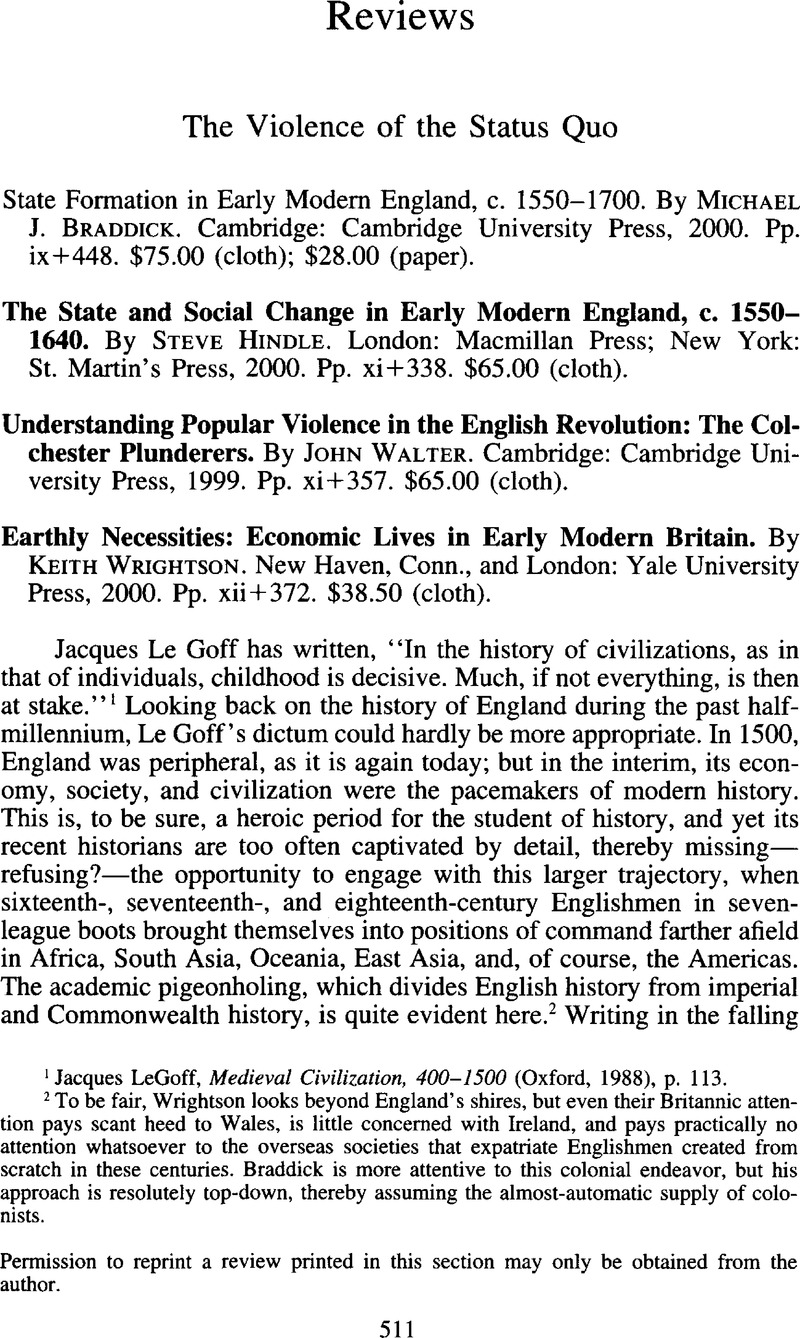No CrossRef data available.
Article contents
The Violence of the Status Quo - State Formation in Early Modern England, c. 1550–1700. By Michael J. Braddick. Cambridge: Cambridge University Press, 2000. Pp. ix+448. $75.00 (cloth); $28.00 (paper). - The State and Social Change in Early Modern England, c. 1550–1640. By Steve Hindle. London: Macmillan Press; New York: St. Martin's Press, 2000. Pp. xi+338. $65.00 (cloth). - Understanding Popular Violence in the English Revolution: The Colchester Plunderers. By John Walter. Cambridge: Cambridge University Press, 1999. Pp. xi+357. $65.00 (cloth). - Earthly Necessities: Economic Lives in Early Modern Britain. By Keith Wrightson. New Haven, Conn., and London: Yale University Press, 2000. Pp. xii+372. $38.50 (cloth).
Published online by Cambridge University Press: 10 May 2013
Abstract

- Type
- Reviews
- Information
- Copyright
- Copyright © North American Conference of British Studies 2002
References
1 LeGoff, Jacques, Medieval Civilization, 400–1500 (Oxford, 1988), p. 113Google Scholar.
2 To be fair, Wrightson looks beyond England's shires, but even their Britannic attention pays scant heed to Wales, is little concerned with Ireland, and pays practically no attention whatsoever to the overseas societies that expatriate Englishmen created from scratch in these centuries. Braddick is more attentive to this colonial endeavor, but his approach is resolutely top-down, thereby assuming the almost-automatic supply of colonists.
3 This, in spite of the fact that Braddick's argument is unnecessarily long and repetitive. Indeed, State Formation in Early Modern England would have been twice the book, at two-thirds the length.
4 Quoted in Plumb, J. H., Sir Robert Walpole: The Making of a Statesman (London, 1956), p. 367Google Scholar.
5 Sacks, David Harris, The Widening Gate: Bristol and the Atlantic Economy, 1450–1700 (Berkeley, 1991)Google Scholar; Estabrook, Carl B., Urbane and Rustic England: Cultural Ties and Social Spheres in the Provinces, 1660–1780 (Stanford, Calif., 1998)Google Scholar. The references to Dickinson are drawn from this work.
6 By way of comparison, when Lord Bute's wife inherited a fortune from the Montagu's Tyneside coal mines, this transfer of money (variously estimated at between £800,000 and £1,300,000) was roughly one thousand times more valuable than the vaunted Getty inheritance of the 1980s, in relation to the national wealth of the time. So, the money incomes from the slave trade were not only spectacular but also annual transfers, not just one-shot affairs.
7 It is perhaps important to belabor this point because the churlishness of the historiographical reception to Williams's, EricCapitalism and Slavery (Chapel Hill, N.C., 1944)Google Scholar has driven a wedge between the Little England and Great Britannic interpretations of English mercantile hegemony. And, to be frank, Williams's insistence that the money drawn from the slave trade went into the Industrial Revolution was wide of the mark. Had he, however, suggested that it provided a consumerist riptide that lifted all the boats, then his arguments might have had resonance with the newer fashion in historiography, which emphasizes how money was spent as opposed to how it was made. See, among many others, Brewer, John, The Pleasures of the Imagination: English Culture in the Eighteenth Century (Chicago, 1997)Google Scholar.
8 His publisher's refusal to permit him to provide footnotes means that Wrightson is more or less forced into making clubby, familiar endorsements. That said, using casual references to ideas suggested to him by Professor X or points made by Dr. Y is a grating way around this problem, and the undergraduate reader will probably get the idea that Wrightson's stylistic chumminess gives his account a kind of state-of-the-art authority that will tend to overwhelm the uninitiated who are unfamiliar with the varying positions that have been staked out by protagonists in a rich and profoundly political historiography. Perhaps this is the inevitable in a textbook; indeed, it might even be argued that a good textbook will tend to swamp dissent by its display of authority. But Wrightson's search for consensus tends to downplay dissent and disagreement. This is simply astonishing, considering that the period he is surveying has been famous for its mean-spirited provocations. And, what is more, that snarkiness has not been without its political vituperation since so much of the debate over the gentry or the causes of the Civil War or the more recent revisionism has been politics carried out by other means.
9 Wrigley, E. A. and Schofield, R. S., The Population History of England and Wales, 1541–1871 (London, 1971)Google Scholar, table A3.3, pp. 531–35, and table 7.14, p. 227.
10 In the preceding examples of nonlinear implications of population growth on marginal populations, I am drawing on Jack Goldstone's insightful commentary in Revolution and Rebellion in the Early Modern World (Berkeley, 1991), pp. 32 ffGoogle Scholar. Wrightson never refers to Goldstone's work in his text; nor is it referenced in his lengthy bibliography.
11 In the demographic conditions prevailing in early modern England, about three-fifths of all families were likely to have had an inheriting son, while another fifth would have had an inheriting daughter; about one-fifth of all niches would become vacant in the course of each generation. See, Wrigley, E. A., “Fertility Strategy for the Individual and the Group,” in Historical Studies of Changing Fertility, ed. Tilly, Charles (Princeton, N.J., 1978), pp. 135–54Google Scholar.
12 Wrightson notes that spatial mobility—“subsistence migration”—within Britain was common before the overseas expansion of the frontier in the second quarter of the seventeenth century, but he does not connect these phenomena.
13 Holmes, G. S., “Gregory King and the Social Structure of Pre-industrial England,” Transactions of the Royal Historical Society, 5th ser., 27 (1977): 41–68CrossRefGoogle Scholar.




